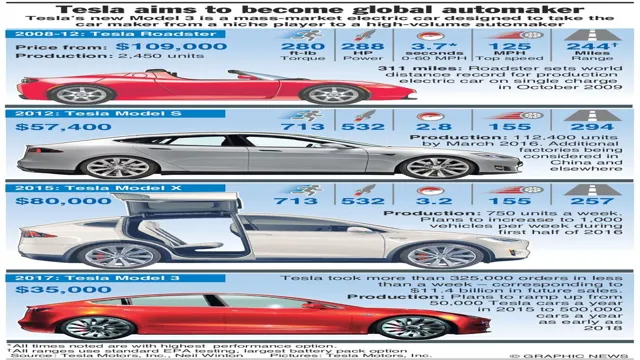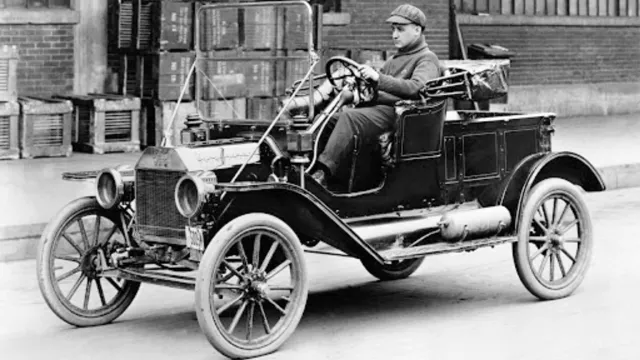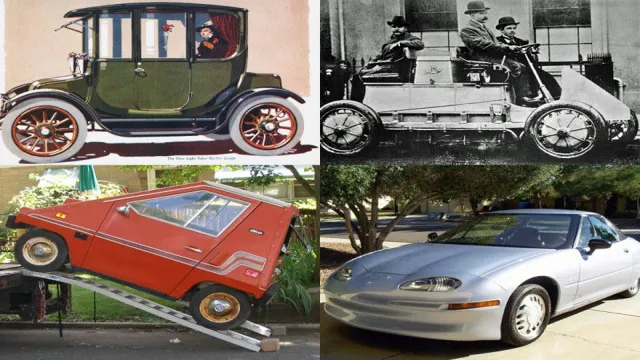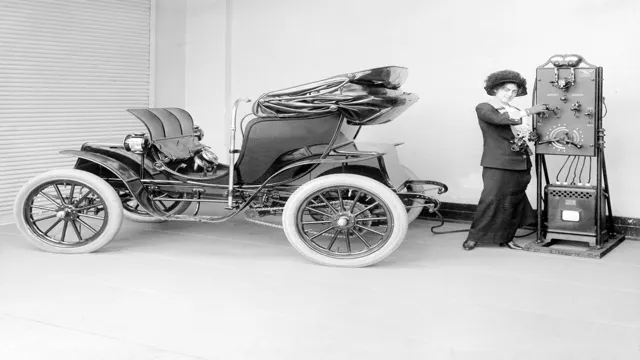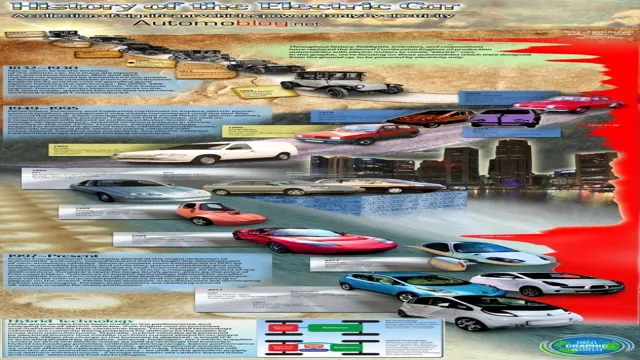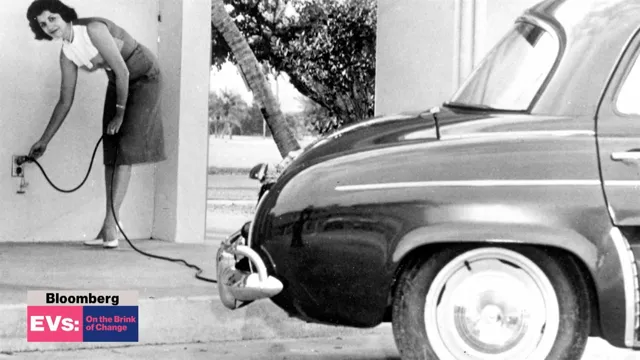Revolutionizing the Road: Tracing the History and Evolution of Electric Cars
Electric cars have come a long way since their humble beginnings in the 19th century. Initially seen as a novelty, they were gradually outpaced by the internal combustion engine, which allowed for greater speed and range. However, in recent years, electric cars have made a resurgence as the world searches for sustainable alternatives to fossil fuel-powered vehicles.
With major car companies investing in electric technology and the increasing availability of charging stations, it begs the question: What is the history of electric cars, and where are they headed in the future? Let’s take a brief journey through time to explore the evolution of electric cars and their potential to reshape the automotive industry.
Early Days of Electric Cars
The history and evolution of electric cars dates back to the early 1800s when inventors were first experimenting with battery technology. The first electric car was created in the 1830s by Scottish inventor Robert Anderson. Throughout the 1800s, electric cars were seen as a viable alternative to gasoline-powered vehicles, and by the early 1900s, electric cars had even outsold gasoline ones.
However, with the development of the internal combustion engine, gasoline quickly became the dominant choice for powering cars. It was not until the 1990s that electric cars once again began to gain popularity. Advances in battery technology, coupled with increased concern over the environmental impact of gasoline-powered vehicles, saw the resurgence in electric cars.
Today, electric cars continue to evolve and improve, with innovations in battery technology and infrastructure helping to make them a more viable choice for everyday driving. As we move towards a more sustainable future, it’s likely that electric cars will continue to play a crucial role in reducing our dependence on fossil fuels.
Development of the First Electric Cars
The early days of electric cars date back to the 19th century when inventors were experimenting with electric motors and batteries. The first electric car was invented in 1835 by Thomas Davenport, who used a small electric motor to power a model car. Over the next few decades, several other inventors such as Robert Anderson and Gustave Trouvé developed similar prototypes.
However, it was in the 1890s when electric cars began to gain popularity, especially in urban areas where gasoline-powered vehicles were causing air pollution and noise pollution. Manufacturers like Pope Manufacturing Company and Baker Electric started producing electric cars on a larger scale, and they became the preferred mode of transportation for women because they were easy to operate and didn’t require manual cranking like their gasoline counterparts. While electric cars fell out of favor in the early 20th century due to advances in gasoline engine technology and the availability of cheap oil, they made a comeback in recent years with the development of more efficient batteries and motors.
Today, electric cars are seen as a viable alternative to gasoline-powered cars and contribute to reducing greenhouse gas emissions.
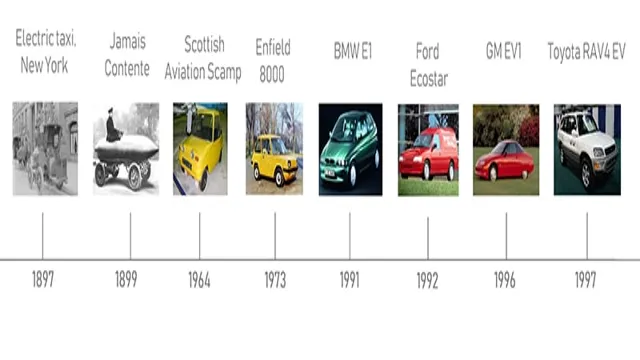
Popularity of Electric Cars in the Late 19th Century
The early days of electric cars date back to the late 19th century when these vehicles were first introduced to the public. Although they were not as popular as steam and gasoline cars during those times, there was still a significant demand for electric cars. The technology behind them was considered groundbreaking at the time, and people were fascinated by the idea of a car that ran on electricity.
Electric cars had a considerable advantage over gasoline cars, as they were cleaner and did not emit harmful pollutants into the air. They were also quieter and required less maintenance than gasoline cars. However, the high cost of batteries and the limited range of electric cars hindered their growth and popularity, leading to the rise of gasoline-powered cars as the dominant mode of transportation.
It wasn’t until recently that electric cars started gaining popularity once again, with advancements in battery technology and the growing concern for the environment. Today, electric cars have become a viable alternative to traditional gasoline-powered cars, offering increased efficiency and helping to reduce carbon emissions.
Decline of Electric Cars
A brief history and evolution of electric cars is plagued with ups and downs. In the early 1900s, electric cars were popular due to their quiet operation and ease of use, but they soon fell out of favor with the advent of gasoline-powered vehicles. Fast forward to the early 2000s, and electric cars began to make a comeback, spurred in part by increased concern over climate change and the push for alternative energy sources.
However, this resurgence was short-lived, with many consumers turned off by their high price point and limited driving range. In recent years, electric cars have made a renewed push in the market, with longer ranges and more affordable options. Despite this, the decline of electric cars in the past has taught manufacturers that innovation and affordability are key to securing a sustainable future for electric vehicles.
Rise of Gasoline-Powered Cars
The rise of gasoline-powered cars marked the decline of electric cars. In the early 1900s, electric cars were popular among the elite, but the mass production of gasoline-powered cars made them more affordable and accessible to the general public. The combustion engine was more efficient and had a longer range than electric cars, which required frequent recharging.
Additionally, the development of gasoline infrastructure, such as fueling stations and pipelines, further cemented the dominance of gasoline-powered cars on the market. This shift also had a cultural impact, as cars became symbols of freedom and independence in American culture. As a result, electric cars were largely abandoned and forgotten for several decades until the recent resurgence of electric and hybrid vehicles in response to climate change concerns and advancements in battery technology.
It’s fascinating to see how history repeats itself, as we face similar challenges today but with a different perspective and set of tools at our disposal.
Challenges of Electric Cars in the 20th Century
As we look back at the challenges of electric cars in the 20th century, one of the prominent factors was the decline of electric cars. The electric car industry faced numerous challenges that led to their eventual decline and temporary disappearance from the market. One of the main contributors was the high cost of producing the batteries required to power these cars.
Gasoline-powered cars became the norm because they were cheaper and oil companies were heavily invested in their production. Moreover, the lack of infrastructure for charging electric cars was another significant challenge. Electric cars required charging stations, which were not as widely available as gas stations, and it made it challenging for electric car owners to embark on longer journeys or road trips without being concerned about running out of charge.
However, with the advances in technology, the electric car industry is now making a comeback, and electric cars are becoming more efficient, cheaper, and environmental-friendly. As governments across the world focus on achieving a greener and sustainable future, the future of electric cars looks promising.
Revival of Electric Cars in the 21st Century
In the late 19th century, electric cars were booming, and many believed they would replace gasoline-powered vehicles. However, the invention of the electric starter motor and the mass production of Model T Ford cars led to the decline of electric cars. Gasoline vehicles were more convenient and had a longer range than electric cars, making them much more attractive to consumers.
This led to a halt in the production of electric cars and the onset of gasoline-powered cars, which continued to dominate the industry for the next century. But the 21st century has seen a revival of electric cars, with advanced technology and a greater awareness of environmental concerns. Battery technology has significantly improved, making electric cars more feasible and reliable.
Governments and consumers worldwide are pushing for the use of cleaner energy, which has led to the rise in popularity of electric cars. Today, there are many electric car models available, with some even offering a range of over 400 miles on a single charge. These cars are not only environmentally friendly, but are also cheaper and require less maintenance than gasoline vehicles.
The future of electric cars looks promising, with companies investing heavily in research and development to improve battery technology and reduce costs. The increasing availability of charging stations and incentives for owning an electric car will only help to facilitate their growth in the automotive industry. The world is realizing the importance of cleaner energy and the role electric cars can play in reducing carbon emissions.
As a result, it’s safe to say that the future is bright for electric cars.
Electric Cars Today
Electric cars have come a long way since their inception in the mid-19th century. In fact, the very first electric vehicle was created by a Scottish inventor named Robert Anderson all the way back in 183 However, it wasn’t until the late 1800s that electric cars began to gain popularity as an alternative to gasoline-powered vehicles.
Fast forward to today, and electric cars are more popular than ever, offering drivers a cleaner and more sustainable mode of transportation. With advancements in technology and a growing demand for eco-friendly options, companies like Tesla, Nissan, and Chevrolet have jumped on the electric car bandwagon and developed impressive electric models that can go hundreds of miles between charges. Although they still face some challenges, such as a lack of charging infrastructure and higher upfront costs compared to traditional cars, electric cars are rapidly evolving and making their place in the automotive industry.
It won’t be long before we see even more affordable, efficient, and high-tech electric cars on the roads.
Overview of Modern Electric Cars
When it comes to modern electric cars, there’s a lot to be excited about. These vehicles have come a long way in recent years, offering impressive battery life, powerful performance, and a range of cutting-edge features. Today’s electric cars are designed with the needs of drivers in mind, offering everything from spacious interiors and advanced technology to eco-friendly features and low maintenance costs.
Whether you’re looking for a sleek sedan or a versatile SUV, there’s an electric car out there that can meet your needs. So why not join the growing number of drivers who are making the switch to electric? With all the benefits that these cars offer, it’s a decision that you’re unlikely to regret.
Advancements in Technology and Sustainability
Electric Cars Today Electric cars are becoming more and more commonplace in today’s world of advancing technology and sustainability. These vehicles, powered by electricity alone, use rechargeable batteries and emit zero emissions. With the world’s growing concern for the environment, electric cars have risen in popularity due to their eco-friendly nature.
Not only do they produce no emissions, but they also require less maintenance and are often cheaper to operate than traditional gas-powered cars. This makes electric cars a great option for those looking to be more sustainable while also saving money in the long run. Additionally, advancements in electric car technology have led to longer-lasting batteries and faster charging times, making them a more convenient choice for everyday use.
As the world continues to prioritize sustainability and technological advancement, electric cars will likely become an even more prevalent choice on the roads of the future.
The Future of Electric Cars
Electric cars have come a long way since their inception in the early 1800s. While they may have seemed like a novelty at the time, these vehicles have continued to evolve and adapt throughout the years. Initially powered by rechargeable batteries, they were eventually replaced by gas-powered vehicles, which quickly became the norm.
However, with technological advancements and a greater push towards sustainability, electric cars have once again become a popular option for drivers. With better battery life, faster charging times, and improved performance, the future of electric cars looks bright. They are not only a more eco-friendly option but are also becoming more and more affordable, which is making them accessible to more people.
As we continue to strive towards a greener future, electric cars are poised to play a significant role in reducing our carbon footprint.
Conclusion
From their humble beginnings as glorified golf carts, electric cars have come a long way. Innovations in battery technology and design have made them more practical and convenient than ever before. And with the increasing demand for sustainable transportation, electric cars are quickly becoming the vehicle of choice for eco-conscious drivers.
So if you’re still stuck on the fence about whether to go electric or not, just remember: the future is electric, and it’s brighter than ever!”
FAQs
When were the first electric cars invented?
The first electric cars were invented in the 1830s-1840s.
When did electric cars become more popular?
Electric cars became more popular in the late 1800s and early 1900s.
Why did electric cars lose popularity?
Electric cars lost popularity due to the increase in availability and affordability of gasoline-powered cars.
When did electric cars start to make a comeback?
Electric cars started to make a comeback in the 1990s with the introduction of modern, more efficient electric vehicle technology.
What are some advantages of driving an electric car?
Advantages of driving an electric car include lower emissions, lower operating costs, and a quieter driving experience.
